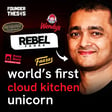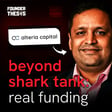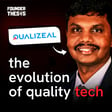
The Future is Climate AI Solutions | Rohit Toshniwal (Sprih)
"Behind the scenes, it's a Climate AI. It's a very deep Climate AI engine that we have built, which drives all of these workflows."
Rohit Toshniwal pulls back the curtain on the sophisticated technology needed to tackle complex environmental challenges, highlighting how Artificial Intelligence is becoming essential for managing sustainability data and driving climate action. Rohit Toshniwal is a serial tech entrepreneur and Co-Founder of Sprih, which builds a Carbon Intelligence and Management platform using Climate AI to help organizations catalyze climate action. An IIT Kanpur graduate, Rohit previously co-founded Arkin Net, acquired by VMware for over $100 million, and helped scale that business within VMware to ~$250 million in revenue.
Key Insights from the Conversation:
👉Why tracking environmental and social impact is becoming critical for businesses, driven by regulations, investors, and customers.
👉 Understanding Carbon Dioxide Equivalence (CO2e) as a key metric for environmental performance.
👉 How strong performance on sustainability metrics can unlock preferential financing and attract talent.
👉 The role of technology, particularly Climate AI, in simplifying complex data collection, analysis, and reporting for climate action.
👉 Lessons from building and selling Arkin Net, and scaling it post-acquisition.
👉 The importance of long-term vision and the right partners for building sustainable businesses.
Chapters:
👉 00:00:51 - Intro: Rohit's Journey into Green Tech & Sustainability
👉 00:04:30 - Understanding Corporate Impact: Beyond Finance
👉 00:09:39 - Why All Companies Should Track Climate Impact
👉 00:15:07 - Deep Dive: Understanding Carbon Reporting & CO2e
👉 00:20:13 - Climate Performance, Capital Access & Business Advantage
👉 00:26:05 - Introducing Sprih: Climate AI for Carbon Management
👉 00:39:50 - The Market Opportunity in Climate Tech & Carbon Intelligence
👉 00:57:25 - Rohit's Early Career: From Cisco to Startups & VMware
👉 01:02:42 - The Arkin Net Story: Building & Selling for more than $100 Million
👉 01:06:30 - Scaling Post-Acquisition: Growing to $250M within VMware
👉 01:11:31 - Engineer's Take: How to Build a $250M Business
👉 01:18:29 - Building Philosophy: Focus on Roots, Not Flowers
#Sustainability #ClimateTech #CarbonReporting #ClimateAI #CarbonIntelligence #Sprih #FounderThesis #StartupIndia #Entrepreneurship #TechFounder #FounderJourney #BusinessStrategy #VMware #IITKanpur #NetZero #ImpactInvesting #ClimateAction #IndianStartups



















